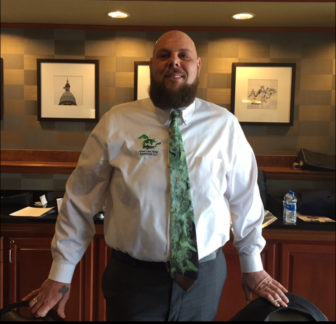The Michigan Cannabis Business Development Group hosted The Michigan Hemp Conference on Sunday March 17 in downtown Lansing. The Michigan Hemp Conference analyzed new state and federal laws surrounding licensing, processing, distribution and medicine.
Attorneys, business owners, residents, caregivers and other people attended to discuss Michigan’s cannabis future.
Terminology
Hemp, or industrial hemp, is any part of a growing or non-growing cannabis sativa l. plant that has less than .3 percent of THC in dry weight, according to the federal law and Michigan law.
In legal documents, “industrial hemp” and “hemp” appear with the same definition.
“Industrial hemp is a legal term that appeared under the Industrial Hemp Research and Development Act. Hemp appears under the 2018 Farm Bill,” said attorney Joshua Colton.
Legislation

Attorney Michael Komorn of Komorn Law
A farm bill is a package of laws passed every five years that regulates agriculture and related issues. The farm bill allowed the use, production and distribution of hemp recreationally when licensed.
Anyone who wishes to grow or process hemp has to apply for a license.
Citizens can obtain both licenses. Currently, Michigan’s Licensing and Regulatory Affairs deals with marijuana licensing, while the Michigan Department of Agriculture and Rural Development deals with hemp licensing.
Michigan decriminalized recreational marijuana with Proposal 1, the Marijuana Legalization Initiative, last November. The law took effect Dec. 6.
Prior to 2018, Michigan had the Industrial Hemp Research Act. This pilot program allowed only accredited universities within the state to obtain a license for academic or agricultural research.
Attorney Michael Komorn said universities are required to sign on.
“When the university agrees to licensing, they have the liability for land oversight,” said Komorn.
Funding will not be affected by research because universities have the permission to research hemp as long as they follow guidelines.
No Michigan university has agreed to sign on yet.
CBD
Youth evangelist, certified medical assistant, dad and business owner are all terms that describe Michael Thue, founder and owner of Great Lakes Hemp Supplements.
Thue started Great Lakes Hemp nine years ago because of his daughters’ health conditions: a 4-year-old with brain cancer and a 3-year-old with uncontrollable seizures.
“I remember being the only CBD booth at shows for years,” said Thue.

Great Lakes Hemp Supplements owner Michael Thue
Thue had to create his own market at a time when cannabis wasn’t as accepted as it is now. Thue said he is grateful for not having to create a market anymore, which allows him to focus on educating others.
Cannabidiol, CBD, is an oil derived from hemp, a cannabis plant with a THC level of less than .3 percent in dry weight. Other forms of CBD exist that exceed the .3 percent THC level, however they are illegal according to state and federal laws.
State and federal laws recognize products that contain over .3 percent of THC as marijuana
Thue told conference attendees about the medical benefits of CBD and cautioned future business owners and caregivers.
CBD contains THC, though in an acidic form that causes no psychoactivity.
Accurate dosing is critical when using CBD, said Thue. Benefits mentioned were helping with depression, improving psyche and no psychoactivity.
For future growers, and business owners be wary of CBD sourcing says Thue.
“The CBD industry is unregulated. Know your source.”
Knowing your rights when it comes to cannabis growing, producing or supplying is also important. Michigan is still in the process of creating recreational marijuana rules which have to be finalized by December 2019.